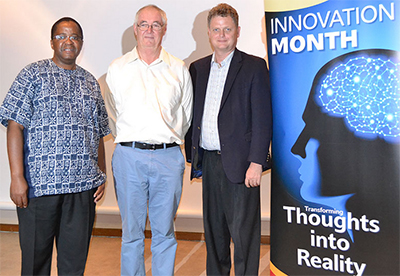News & Events
Friends are thieves of time

Prof Bheki Mamba (Executive Dean: CSET), Prof Johannes Haarhoff (NanoWS Research Unit) & Prof Hugo Lotriet (Head: Graduate Studies and Research, CSET)
Are you struggling to use your time effectively and perform according to the best of your ability in your studies, and are you wondering why? Prof Johannes Haarhoff of Unisa’s NanoWS Research Unit may well provide the panacea you need. Speaking on 2 February 2017 at Unisa’s Science Campus on the seven habits of highly effective graduate students Haarhoff urged students to live as if they were to die tomorrow and learn as if they were to live forever.
Haarhoff believes that there are very few people who are born with talents and everyone can drastically improve their ability while minimising the weaknesses that stand in their path to success. He argued that this would require a new way of doing things, which must be encompassed by a change of attitude. "The easiest thing becomes difficult when you do it reluctantly," he said.
The seven habits of highly effective graduate students are:
- Grab the opportunity
- Work as a team
- Work on your own
- Ask questions
- Synthesise, not just analyse
- Be organised
- Enjoy what you are doing
Haarhoff unpacked each of the seven habits in his presentation, saying students have to internalise them in order to reap the dividends. He said students have to realise the opportunities that come with being a student and use them wisely. He said society places its hope in universities to produce leaders who will solve both old and new challenges.
He said students must learn to work as a team and never shy away from asking questions. "Who questions much, shall learn much, and retain much. If you would be a real seeker after truth, it is necessary that at least once in your life you doubt, as far as possible, all things," he affirmed.
It is often said that the common traits among students who struggle to finish their tasks on time are procrastination and a lack of internal motivation that are inextricably linked with a lack of self-satisfaction.
Haarhoff said being organised is an essential building block students have to master in their career path in order to succeed, and this includes effective time management. He added that time is a major determining factor that requires students to prioritise their activities in order of importance and sense of urgency.
“Friends are thieves of time. Begin doing what you want to do now. We are not living in eternity. We have only this moment, sparkling like a star in our hand and melting like a snowflake,” he explained.
He said it is critical that students find joy in what they do because it will enhance their performance and bring about self-satisfaction, without which no one can succeed in any profession.
Click here for the full presentation.
*By Percy Mthombeni
Publish date: 2017-03-14 00:00:00.0

